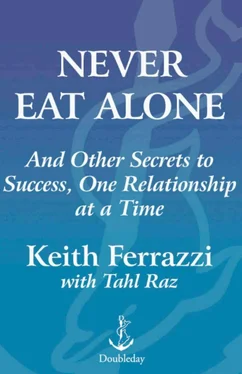Keith Ferrazzi - Never Eat Alone
Здесь есть возможность читать онлайн «Keith Ferrazzi - Never Eat Alone» весь текст электронной книги совершенно бесплатно (целиком полную версию без сокращений). В некоторых случаях можно слушать аудио, скачать через торрент в формате fb2 и присутствует краткое содержание. Год выпуска: 2005, ISBN: 2005, Издательство: C U R R E N C Y • D O U B L E D A Y, Жанр: marketing, на английском языке. Описание произведения, (предисловие) а так же отзывы посетителей доступны на портале библиотеки ЛибКат.
- Название:Never Eat Alone
- Автор:
- Издательство:C U R R E N C Y • D O U B L E D A Y
- Жанр:
- Год:2005
- ISBN:0-385-51529-4
- Рейтинг книги:4 / 5. Голосов: 1
-
Избранное:Добавить в избранное
- Отзывы:
-
Ваша оценка:
- 80
- 1
- 2
- 3
- 4
- 5
Never Eat Alone: краткое содержание, описание и аннотация
Предлагаем к чтению аннотацию, описание, краткое содержание или предисловие (зависит от того, что написал сам автор книги «Never Eat Alone»). Если вы не нашли необходимую информацию о книге — напишите в комментариях, мы постараемся отыскать её.
Never Eat Alone — читать онлайн бесплатно полную книгу (весь текст) целиком
Ниже представлен текст книги, разбитый по страницам. Система сохранения места последней прочитанной страницы, позволяет с удобством читать онлайн бесплатно книгу «Never Eat Alone», без необходимости каждый раз заново искать на чём Вы остановились. Поставьте закладку, и сможете в любой момент перейти на страницу, на которой закончили чтение.
Интервал:
Закладка:
6. Expose yourself to unusual experiences.
When management guru Peter Drucker was asked for one thing that would make a person better in business, he responded, "Learn to play the violin." Different experiences give rise to different tools. Find out what your kids are interested in and why. Stimulate your creativity. Learn about things that are out of the mainstream. Travel to weird and exotic places. Knowing one's own industry and one's native markets is not enough to compete in the future. Take a deep and boundless curiosity about things outside your own profession and comfort zone.
7. Don't get discouraged.
My first e-mail to the CEO of ICI regarding TQM was never returned. To this day, I face rejection on a regular basis. If you're going to be creative, cutting edge, out of the mainstream, you'd better get used to rockin' the boat. And guess what—when you're rockin' the boat, there will always be people who will try and push you off. That's the bet you have to take. Deeply committed professionals need to know the score: Passion keeps you going through the rough times come hell or high water, and both will come. There will be continual changes and challenges requiring you to be persistent and committed. Focus on the results and keep your eyes open for what is happening on the edges of your industry.
8. Know the new technology.
No industry moves quicker or places more emphasis on innovation. You don't need to be a "techno geek," but you do need to understand the impact of technology on your business and be able to leverage it to your benefit. Adopt a techno geek, or at least hire or sire one.
9. Develop a niche.
Successful small businesses that gain renown establish themselves within a carefully selected market niche that they can realistically hope to dominate. Individuals can do the same thing. Think of several areas where your company underperforms and choose to focus on the one area that is least attended to.
A former mentee of mine, for example, works for a growing start-up that offers a new kind of pet product. Not long after he was hired, he noted that one of the countless issues the start-up was struggling with was pricey postal rates that were cutting into the company's margins. Frankly, that's not the kind of issue that registers very high up on the totem pole of priorities for a startup, but then again, this mentee wasn't very high up either.
He took it upon himself to research the problem by calling the official responsible for small business at UPS, FedEx, and others. A few weeks later, he sent a detailed memo to the CEO about how the company could reduce its postal costs. The CEO was delighted. The mentee's niche expertise in mail branded the young man as a valuable up-and-comer in the company, and these days, he's developing expertise in issues much farther up the totem pole.
10. Follow the money.
Creativity is worthless if it can't be applied. The bottom line for your content has to be: This will make us more money. The lifeblood of any company is sales and cash flow. All great ideas are meaningless in business until someone pays for it.
Known as a world leader, holy man, diplomat, hero, and the Tibetan G h a n d i , the Dalai Lama simply prefers to be recognized as "a simple Buddhist monk—no more, no less."
On his great ascent toward wo r ld renown ever since his escape from his homeland in Tibet—fleeing the occupying armies of China in the late 1950s—this unique national figure has captured the public imagination, raised millions of dollars, and rallied celebrities, politicians, and laymen alike to his cause of reclaiming his homeland.
W h a t can the aspiring connector learn from this deeply modest man?
The answer: Powerful content communicated in a compelling story can energize your network to help you achieve your mission.
Because here's the thing with the spiritual leader of the Tibetan people: Folks give him money, love, and support even though he's peddling neither product nor service. Folks pay him, big time, even though he makes no promises about a bountiful return on investment. Folks pay just to hear him speak about life in general, or the struggles of Tibet, his non-nation nation.
You may have thought that a degree in business, or better yet an MBA, was needed to become a leader or person with content. Not true. The Dalai Lama doesn't have a single degree. He does, however, deliver a simple but profound message of wo r ld peace and compassion packaged in colorful stories and anecdotes—a message that earned him the Nobel Peace Prize in 1 9 8 9 .
N o w you might be thinking: " W a i t a minute. There's no w a y you can compare my white-collar pursuit to connect—and the stories I'd be telling to w i n friends and influence people—to the stories that the Dalai Lama has to share. I eat three meals a day. He's been without a country since the Fifties."
And you'd be correct. Your story won't be as compelling as his. But your storyte///ng can be. Here's how:
In telling a gripping story, the Dalai Lama understands that the message must be both simple and universal. Journalist Chris Colin, in speculating w h y the Dalai Lama's cause is so popular, wrote, "Perhaps the clarity of the atrocity resonates in the West, where few international disputes seem so cut and dried . . . Here, in a nation nostalgic for the seemingly black-and-white struggles of the comparatively simpler past, the 'Free Tibet' cause has w i n g s . "
Though he is one of the most learned scholars of one of the most complex of all the world's philosophies, the Dalai Lama is sure not only to present his cause in a clear, simple-to-understand vision, but he also goes to great lengths to show how the cause relates to us all.
The most gripping stories are those concerning identity—who we are, where we've come from, and where we are g o i n g . They tap into something common to all people. The Dalai Lama tells us that to be concerned with the Tibetan people is to be concerned with yourself. "The more we care for the happiness of others," he says, "the greater our own sense of well-being becomes." In this way, he shows how the basic concerns of all people—happiness based on contentment, appeasement of suffering, and the forging of meaningful relationships—can act as the foundation for universal ethics in today's w o r l d . Thus, he appeals to his cause by appealing to everyone's cause.
That doesn't mean your business, your resume, or whatever content you're trying to pitch has to actually be oversimplified or overly universal. But you should figure out how to spin your yarn in a fashion that a) is simple to understand, and b) everybody can relate to. Another w a y to think about this is to ask yourself, " H o w does my content help others answer w h o they are, where they are from, and where they are going?"
On some level, it's still baffling w h y anyone gives money to the Tibetan cause. For the Tibetan cause, arguably, is a lost one; after four decades, China still shows no signs of reversing itself.
And still, the Dalai Lama persuades people to donate their money and energy. How does he do it? One thing he does is use facts and historical examples within his stories to stoke our passions. He does not, as a businessperson might do with graphs and analysis, attempt to logically convince us of his position. He makes us feel his position. For example, check out this Q & A , from a 1 9 9 7 interview in Mother Jones:
Q: W h a t do you think it will take for China to change its policy toward Tibet?
Dalai Lama: It will take two things: first, a Chinese leadership that looks forward instead of b a c k w a r d , that looks toward integration with the world and cares about both wo r ld opinion and the will of [China's] own democracy movement; second, a group of world leaders that listens to the concerns of their own people with regard to Tibet, and speaks firmly to the Chinese about the urgent need of working out a solution based on truth and justice. We do not have these two things today, and so the process of bringing peace to Tibet is stalled. But we must not lose our trust in the power of truth. Everything is always changing in the w o r l d . Look at South Africa, the former Soviet Union, and the M i d d l e East. They still have many problems, setbacks as well as breakthroughs, but basically changes have happened that were considered unthinkable a decade ago.
Читать дальшеИнтервал:
Закладка:
Похожие книги на «Never Eat Alone»
Представляем Вашему вниманию похожие книги на «Never Eat Alone» списком для выбора. Мы отобрали схожую по названию и смыслу литературу в надежде предоставить читателям больше вариантов отыскать новые, интересные, ещё непрочитанные произведения.
Обсуждение, отзывы о книге «Never Eat Alone» и просто собственные мнения читателей. Оставьте ваши комментарии, напишите, что Вы думаете о произведении, его смысле или главных героях. Укажите что конкретно понравилось, а что нет, и почему Вы так считаете.












